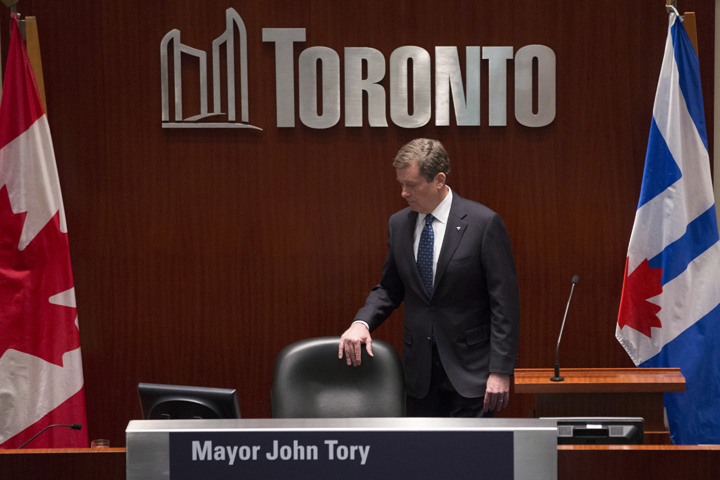TORONTO – If there’s one word Toronto politicians love, it’s “efficiencies.”

It sometimes means budget cuts but sounds friendlier.
And Mayor John Tory insists the city doesn’t need to look at new taxes or revenue sources: He thinks there are “efficiencies” to be found in the city’s budget first.
Tory has yet to say what “efficiencies” he’s talking about or what he thinks should be cut.
But city manager Joe Pennachetti and a report from the Munk School of Global Affairs suggests otherwise. If Toronto wants to build new or even maintain existing infrastructure, they say, the city needs new revenue sources.
The November 2014 Munk report suggested backlog in cash the city needs to spend just to keep existing infrastructure functioning will grow to nearly $2.5 billion by 2020, with Toronto Community Housing accounting for almost $860 million.
Pennachetti said Friday that Toronto will need a sales tax to deal with everything from transit to housing and social services. Property taxes aren’t cutting it.

Get breaking National news
Transit is one of the biggest financial bogeymen facing the city: It takes up a significant chunk of the annual operating budget, and Tory’s ambitious plans for new development would cost billions more in capital costs.
“The City’s fiscal health is sound by most measures, but it faces cost pressures and its aging infrastructure and investment needs present a huge financial challenge,” according to the Munk report.
Right now property taxes fund about 40 per cent of the city budget. The rest comes from user fees and the provincial or federal governments.
Torontonians pay less in property taxes than most Greater Toronto Area cities. And when you account for inflation and population growth property taxes actually fallen since 2000, according to the Munk report.
But the city does have the option, through a review of the City of Toronto Act, of adding additional taxes including a vehicle-registration tax (which it had, but killed under the Ford administration – losing about $60 million annually); an entertainment tax on theatre or sporting events; road tolls; or taxes on parking, alcohol or tobacco.
Most American cities have the power to implement city-specific taxes, making Toronto one of the few major cities on the continent that goes without. Chicago, has a nine percent entertainment tax. Tolls on the Don Valley Parkway, according to a study by a professor at Trent University, could generate up to $120 million each year.
New York City has approximately 24 different taxes. That includes a property tax, land transfer tax, sales tax, income tax, and vehicle tax. The Munk report says New York City generates a third of its revenue from income and sales tax.
But Tory, like his predecessor Rob Ford, is not keen to give Torontonians another tax to pay.
“Let’s focus, as I certainly intend to do in the coming year, in being able to look taxpayers in the eye, before I ask them for any more money and in any other different way, and say to them, ‘All the money we’re taking from you now is being spent in the best way that it can be.’”








Comments